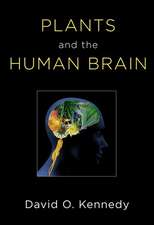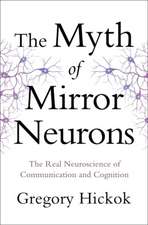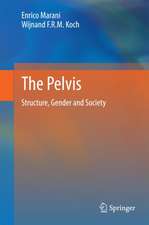The Trigeminal System in Man: Advances in Anatomy, Embryology and Cell Biology, cartea 136
Autor Kamen G. Usunoff, Enrico Marani, Jaap H. R. Schoenen Limba Engleză Paperback – 19 iun 1997
Din seria Advances in Anatomy, Embryology and Cell Biology
- 5%
 Preț: 1146.33 lei
Preț: 1146.33 lei - 5%
 Preț: 721.19 lei
Preț: 721.19 lei - 15%
 Preț: 637.13 lei
Preț: 637.13 lei -
 Preț: 381.81 lei
Preț: 381.81 lei - 15%
 Preț: 644.95 lei
Preț: 644.95 lei - 5%
 Preț: 1025.16 lei
Preț: 1025.16 lei - 15%
 Preț: 689.97 lei
Preț: 689.97 lei - 15%
 Preț: 577.07 lei
Preț: 577.07 lei - 15%
 Preț: 580.36 lei
Preț: 580.36 lei - 5%
 Preț: 393.51 lei
Preț: 393.51 lei -
 Preț: 408.66 lei
Preț: 408.66 lei -
![Die Schlüpfdrüse der Geburtshelferkröte (Alytes o. obstetricans [LAURENTI]) und anderer Froschlurche](https://i4.books-express.ro/bs/9783662239742/die-schluepfdruese-der-geburtshelferkroete-alytes-o-obstetricans-laurenti-und-anderer-froschlurche.jpg) Preț: 408.27 lei
Preț: 408.27 lei - 5%
 Preț: 1090.61 lei
Preț: 1090.61 lei - 5%
 Preț: 705.11 lei
Preț: 705.11 lei - 5%
 Preț: 706.04 lei
Preț: 706.04 lei - 5%
 Preț: 357.61 lei
Preț: 357.61 lei - 5%
 Preț: 704.59 lei
Preț: 704.59 lei - 5%
 Preț: 705.11 lei
Preț: 705.11 lei - 5%
 Preț: 359.42 lei
Preț: 359.42 lei - 5%
 Preț: 711.52 lei
Preț: 711.52 lei - 15%
 Preț: 635.47 lei
Preț: 635.47 lei - 15%
 Preț: 631.72 lei
Preț: 631.72 lei - 15%
 Preț: 633.35 lei
Preț: 633.35 lei - 15%
 Preț: 632.37 lei
Preț: 632.37 lei - 5%
 Preț: 706.60 lei
Preț: 706.60 lei - 15%
 Preț: 631.07 lei
Preț: 631.07 lei - 5%
 Preț: 707.13 lei
Preț: 707.13 lei - 5%
 Preț: 707.33 lei
Preț: 707.33 lei - 5%
 Preț: 359.60 lei
Preț: 359.60 lei - 5%
 Preț: 707.69 lei
Preț: 707.69 lei - 5%
 Preț: 707.13 lei
Preț: 707.13 lei - 5%
 Preț: 708.06 lei
Preț: 708.06 lei - 5%
 Preț: 706.41 lei
Preț: 706.41 lei - 5%
 Preț: 708.78 lei
Preț: 708.78 lei - 5%
 Preț: 705.68 lei
Preț: 705.68 lei - 5%
 Preț: 705.11 lei
Preț: 705.11 lei - 5%
 Preț: 706.77 lei
Preț: 706.77 lei - 15%
 Preț: 635.15 lei
Preț: 635.15 lei - 15%
 Preț: 631.07 lei
Preț: 631.07 lei - 5%
 Preț: 706.77 lei
Preț: 706.77 lei - 5%
 Preț: 706.04 lei
Preț: 706.04 lei - 5%
 Preț: 710.79 lei
Preț: 710.79 lei - 5%
 Preț: 705.32 lei
Preț: 705.32 lei - 15%
 Preț: 633.19 lei
Preț: 633.19 lei - 15%
 Preț: 629.09 lei
Preț: 629.09 lei - 15%
 Preț: 633.53 lei
Preț: 633.53 lei - 15%
 Preț: 632.70 lei
Preț: 632.70 lei - 15%
 Preț: 633.68 lei
Preț: 633.68 lei - 15%
 Preț: 630.43 lei
Preț: 630.43 lei
Preț: 773.72 lei
Preț vechi: 943.57 lei
-18% Nou
Puncte Express: 1161
Preț estimativ în valută:
148.07€ • 154.02$ • 122.24£
148.07€ • 154.02$ • 122.24£
Carte tipărită la comandă
Livrare economică 14-28 aprilie
Preluare comenzi: 021 569.72.76
Specificații
ISBN-13: 9783540627869
ISBN-10: 3540627863
Pagini: 140
Ilustrații: X, 126 p. 36 illus.
Dimensiuni: 155 x 235 x 7 mm
Greutate: 0.2 kg
Ediția:Softcover reprint of the original 1st ed. 1997
Editura: Springer Berlin, Heidelberg
Colecția Springer
Seria Advances in Anatomy, Embryology and Cell Biology
Locul publicării:Berlin, Heidelberg, Germany
ISBN-10: 3540627863
Pagini: 140
Ilustrații: X, 126 p. 36 illus.
Dimensiuni: 155 x 235 x 7 mm
Greutate: 0.2 kg
Ediția:Softcover reprint of the original 1st ed. 1997
Editura: Springer Berlin, Heidelberg
Colecția Springer
Seria Advances in Anatomy, Embryology and Cell Biology
Locul publicării:Berlin, Heidelberg, Germany
Public țintă
ResearchCuprins
1 Introduction.- 2 Material and Methods.- 3 Results.- 3.1 Normal Cyoarchitecture and Myeloarchitecture of the Trigeminal Nuclear Complex.- 3.2 Neuropathologic Cases.- 4 Discussion.- 4.1 Normal Structure of the Trigeminal Nuclei.- 4.2 Discussion of the Trigeminal Pathways.- 5 Summary.- 5.1 Normal Structure of the Trigeminal Nuclei.- 5.2 Trigeminal Pathways.- Acknowledgements.- References.
Textul de pe ultima copertă
This monograph offers a comprehensive review of present knowledge of the structure and connections of the trigeminal nuclei in humans, and compares it to laboratory animal findings. The authors provide cytoarchitectural data from their own research, and trace trigeminal pathways in human material by means of the Nauta technique. In humans the trigeminal nuclear complex includes the motor nucleus, the principal sensory (pontine) nucleus, the spinal nucleus (subdivided into oral, interpolar and caudal nuclei), and the mesencephalic nucleus and several small nuclei. The supratrigeminal nucleus, as described in various mammals, is not defined in the human brain. The primary afferents to all subdivisions of the trigeminal nuclear complex in humans appear to be entirely ipsilateral. Some of the "extratrigeminal" primary afferents described in experimental animals are also present in the human brain and the nucleus ovalis receives primary and possibly secondary afferents from the trigeminal systems. A significant difference between the human trigeminal system and the subprimate species is seen in the monosynaptic cortical projection to the motor trigeminal nucleus.














